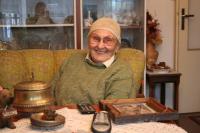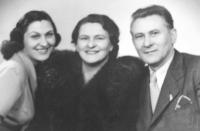Everybody has got some kind of fate but your nature plays a crucial role

Download image
Vlasta Křenková, neé Holá, was born in Prague on April 30, 1922. She was brought up in the patriotic spirit of the First Republic. She was considerably influenced by her father who was an Italian legionnaire. The family lived in the centre of Prague where Vlasta attended primary school and later on grammar school in Dušní Street. Over time, the aversion towards Germans intensified more in society, which rapidly culminated after the events in 1938 and 1939. Vlasta didn’t join the resistance movement at the beginning of the war. However, her father was active. She herself participated in the resistance movement after the father of her friend had asked her to do so. She distributed parcels including magazine In Fight all over Prague. After a year and a half, the Germans arrested the core of its publishers, which meant the end of her distributing activity. She worked in labs for testing seeds at the end of the war. Her mother got the job for her to protect her from the threatening recruitment for work in the Reich. During the days of the Prague uprising she helped as a nurse. She was capable of dragging a shot rebel in a heroic way to an improvised first-aid station. She started studying Art History after the war. However, she got married after two terms, and because of her bad personal file she and her husband had to change their address. They lived in Levín in Litoměřice region. Nevertheless, they moved back to Prague soon, especially because of the SNB (State Security) checks that were organised by their greedy tenant. She got divorced from her husband and luckily got a job in conservation. Then she got married again and moved to Frenštát pod Radhoštěm. She studied Pedagogy and started teaching Czech and History in the local Secondary School of Engineering. After the death of her husband she returned to Prague.

